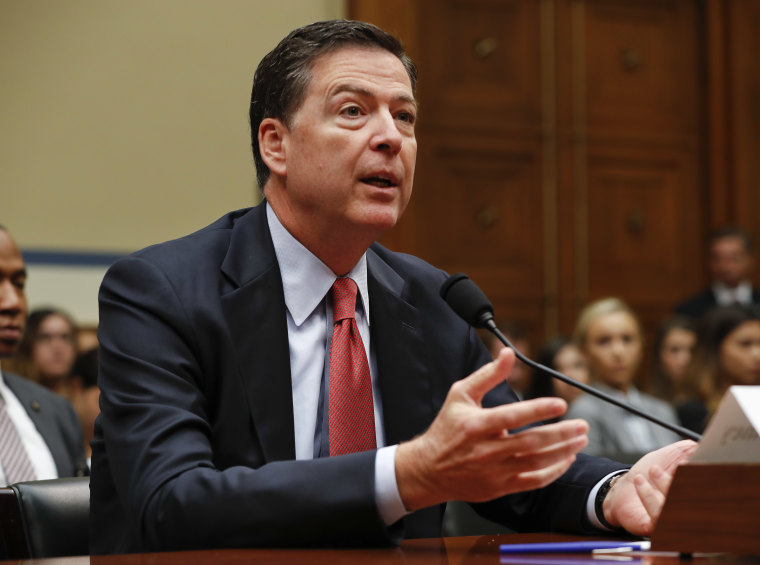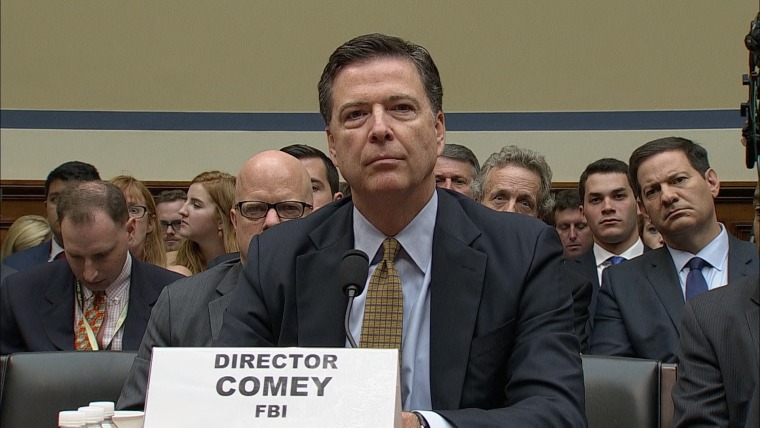The Justice Department opposed the FBI's plan to notify Congress about the discovery of new emails that could be relevant to the investigation of Hillary Clinton's email server, according to senior officials familiar with the discussions.
FBI Director James Comey concluded, however, that informing Congress was better than waiting until after the election and hoping in the meantime that the fact of the discovery wouldn't leak.
"In the end, we decided it was better to keep Congress informed," an FBI official involved in the process said Saturday.
The letter, sent to 16 members of the House and Senate and instantly made public by some of their staff members, was a political bombshell. It produced immediate bipartisan calls for more details about what was behind it.
Related: Emails Related to Clinton Case Found in Anthony Weiner Investigation
Law enforcement officials have said that the emails were discovered by agents investigating whether former Congressman Anthony Weiner, using devices including a laptop computer, sent illicit messages and photos to an underage girl. The agents found that Weiner's wife, current and former top Clinton aide Huma Abedin, used the same laptop to send thousands of e-mails to Hillary Clinton.
Officials familiar with the investigation say reports that the FBI approached Abedin to expedite obtaining access to her emails are false. Instead, they say, the FBI has had Weiner’s laptop for several weeks and are now working to secure a warrant to investigate Abedin’s emails from a federal magistrate.

If granted the warrant, officials will attempt to eliminate any duplicate emails from those previously investigated, and determine whether classified information was sent either by Clinton or her aides using the private server.
According to officials, the FBI had known of the existence of the emails for a few days before Comey was notified that they could be significant.
Related: Clinton Slams FBI Chief James Comey's Letter as 'Deeply Troubling'
The officials familiar with the discussions said that, while the Justice Department did not prohibit the FBI, which is a DOJ agency, from sending the letter, it strongly advised against it.
They cited long-standing policies against disclosing details of investigations that are underway or taking actions that could affect an election, especially in the period leading up to one.
That was especially so, they said, given that FBI agents have not yet analyzed the newly discovered e-mails to see if they contain classified information, the central issue in the investigation of the Clinton private e-mail server.
Comey's letter said the FBI learned "of the existence of e-mails that appear to be pertinent" to the Clinton investigation, though he added that the FBI “cannot yet assess whether or not this material may be significant."
In an internal note sent to FBI employees, Comey said "we don't ordinarily tell Congress about ongoing investigations, but here I feel an obligation to do so given that I testified repeatedly in recent months that our investigation was completed."
"I also think it would be misleading to the American people were we not to supplement the record. At the same time, however, given that we don't know the significance of this newly discovered collection of e-mails, I don't want to create a misleading impression," his note said.
"We were well aware of the policies DOJ was citing," the FBI official said Saturday, "and we all understood them."
But the official said the FBI also believed it was highly probable that word of the development would leak, "and be translated through all kinds of different forums, which would be worse."
Members of Congress from both parties called on the FBI to disclose more details about the discovery, but it did not appear Saturday that the FBI was considering doing so.
Nonetheless, the move was strongly condemned by some former DOJ officials.
"The long-standing practice is to go out of your way to avoid doing anything that could tip the scales in the days before an election," said Matt Miller, a former Justice Department spokesman in the Obama administration.
Related: Fact Checking Everything Said About the FBI Email Review
He said the letter raised more questions than it answered in the public mind. "Most people, when they hear that the FBI is involved, automatically assume the negative."
In his note to employees, Comey said he realized that "in the middle of an election season, there is significant risk of being misunderstood." His letter to Congress, he said, was an effort "to strike the right balance."

